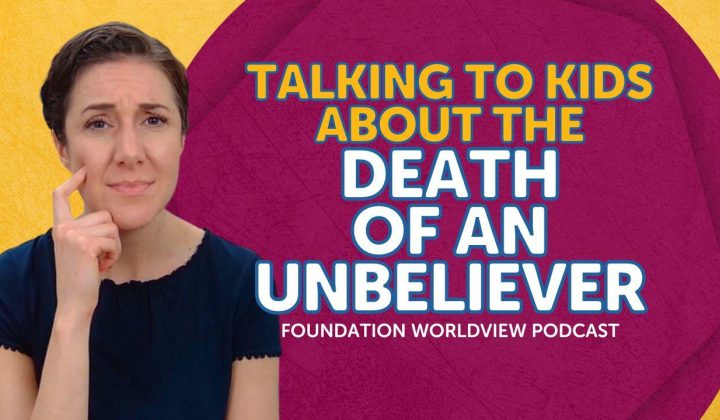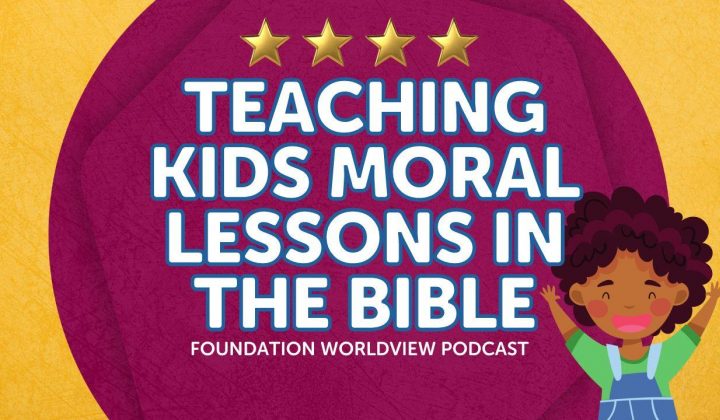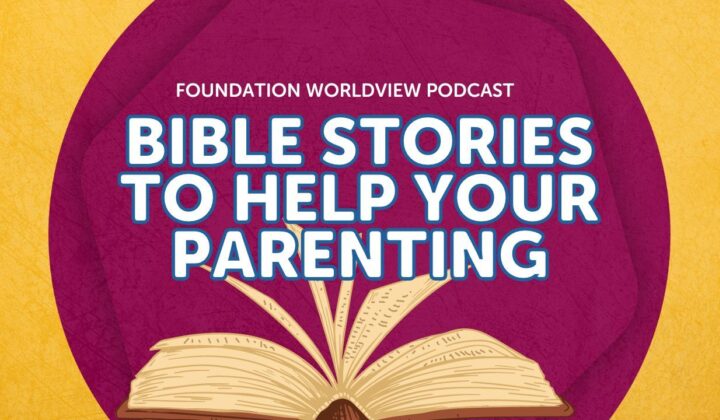Learn more about the journey that led to us equipping kids to carefully evaluate every idea they encounter.
Meet members of our team who have contributed to curriculum development.
Hear from real users of the Foundation Curriculum.
Learn what we believe about God, Jesus, Scripture, and more.
Using Apologetics to Teach Kids to Read the Bible
Today's question says, "Where would you fit apologetics for the Bible, the accuracy of the Bible, the origin of the Bible, et cetera, into teaching kids how to read the Bible?" Join Elizabeth Urbanowicz as she looks at how to equip kids to read the Bible and also to understand why we can trust the Bible as we seek to make faithful disciples of the children that God has placed in our care.
Transcript
Note: The following is an auto-transcript of the podcast recording.
Hello friends, and welcome to another episode of the Foundation Worldview Podcast where we seek to answer your questions so that you can equip the children that God has placed in your care to carefully evaluate every idea they encounter and understand the truth of the biblical worldview. I'm your host, Elizabeth Urbanowicz, and I'm thrilled that you've joined me for another episode today. Now, today's question says, "where would you fit apologetics for the Bible, accuracy of the Bible, origin of the Bible, et cetera, into teaching kids how to read the Bible?" Now, when we received this question, I got so excited because I love that this parent is thinking through how do I equip my kids to read the Bible and also to understand why we can trust the Bible? Those are two different questions, but so important to think through both of them as we seek to make faithful disciples of the children that God has placed in our care.
As is typical, before we dive down deep into this question, I ask that if you have found the contents of this podcast to be beneficial that you would like and subscribe, to make sure that you never miss any future episodes, and also ask that you would consider taking the time to write a review so that more people can find this content and we can equip as many Christian adults as possible to get the kids in their care carefully evaluating every idea they encounter.
Now, as we think through this question, "how do we incorporate both teaching our kids how to read Scripture and apologetics for the Bible?", those of you who have followed this ministry for a long time know that, the first thing I'm going to recommend is that we just immerse our kids in Scripture from the youngest of ages, that even when our kids are two and three years old, before we tuck them into bed at night, we should be reading Scripture with them.
It's just a habit that we should be in, and then by the time they're eight years old, that's when we can begin implementing teaching them how to read Scripture and understanding why it is that we can trust Scripture because it's around the age of eight when they can be solid readers and also when their critical thinking skills are beginning to develop. Now, not all children are identical. Some children might be ready for this at age seven. Some children it might take a little longer and they might need until the age of nine or 10, but in general, the age of eight is when we can begin these two things. Now, what I recommend is that we do both of these things mentioned side by side that we teach our children how to soundly read, interpret, and apply Scripture while also equipping them to understand the apologetic evidence behind Scripture - why it is that we can trust Scripture.
So the two resources that I highly recommend for doing these two things for reading, interpreting, and applying Scripture in a sound way, I recommend our Foundation Worldview Studying the Bible Curriculum because that curriculum is going to take you through a whole unit on the entire narrative of Scripture, a whole unit on skills that kids need to read, interpret, and apply Scripture and a whole unit on how to read the different genres that are included in Scripture. And there's nothing else like it out for kids that's not going to create dependence on some author or some company or some Bible study materials that's actually going to equip them to do that on their own. Our goal with that curriculum is by the end of that curriculum, your children will not need us to equip them to read Scripture that they will be equipped to do it on their own. And then the resource that I recommend for teaching our kids the apologetic evidence behind Scripture is the book Cold-Case Christianity for Kids that it's a book written by Detective J. Warner Wallace, who's a cold case homicide detective in LA, and he takes kids through this story where they use the skills that a cold case homicide detective would use and apply them to the gospels showing how we can trust the eyewitness testimony of the gospel writers.
So would just recommend that you use these two resources in tandem and they're great for doing both of those things, teaching our kids to soundly read, interpret, and apply Scripture and understanding the truth of Scripture. So now the ins and the outs of, okay, how would we do this with our children? I'm going to recommend that we do three things as we're teaching our kids how to read Scripture and then also the apologetic evidence behind the reliability of Scripture. The first thing that I recommend that we do is start off by finding out where our kids are. This is just something that a good teacher does that rather than diving straight into a lesson, we find out, okay, what do my students already know? Where are things, areas that I don't need to cover because they're already solid in them? What are areas that they don't know anything about that I need to cover for the first time?
What are areas where they're weak in that I need to dive down deep into? So first, with thinking about just reading and interpreting and applying Scripture, we can ask our kids, "what do you think is important for us to know as we begin diving into God's word? What are some things that are important for us to know about the Bible?" Just ask them that question and let them list their answers. Then when we think about helping them understand the reliability of Scripture, we can ask them, "do you think the Bible is true?" And then depending on what their answer is, we say, "okay, why do you think the Bible is true? What evidence is there or why do you think the Bible is not true? What evidence is there against the Bible?" Most of our kids, when we ask them if they think that the Bible is true, if they've grown up in our homes, they're probably going to say "yes" because we've been telling them this for their whole lives and they're just going to automatically adopt our worldview.
However, one day that's not going to be the case, so that's why we should follow up with that second question, "well, why do you believe the Bible is true?" They may have some good reasons for believing it. They may not have good reasons at all. If our children say no, they don't believe the Bible is true, that might be the first time we heard that, and we want to make sure that we know that so that we can walk them through this and say, "okay, I'm really glad that you shared that with me. Why is it? What evidence do you think there is against the Bible? Why don't you think we can trust the Bible?" so that we hear their reasoning, and then we should begin equipping them with the skills that they need to read and apply Scripture, and then equipping them to understand the apologetic evidence behind the reliability of Scripture.
Then as you go through the materials I just suggested, or if you have materials of your own or you have other things that you want to do to teach your kids to read Scripture and to teach them the reliability of Scripture, as you're going through those materials, check in with them and ask them as you're going through reading the Bible with your kids, "okay, what have you learned as we have been learning how to study the Bible? What are some of the skills that you've learned and allow them to articulate the things that they have learned." Then as you're going through the apologetic evidence for the reliability of Scripture, ask them, "okay, what are your current thoughts on whether or not we can trust the Bible? Why do you think we can trust the Bible now? Or why do you now not think that we can trust the Bible?" and ask them for the evidence to support those ideas.
Then at the end, once you have given them the skills that they need to soundly read, interpret, and apply Scripture, you can ask them what has stayed the same or changed in how you read Scripture. So ask them to compare and contrast what has stayed the same with how you read the Bible from when we first started until now and what has changed.
Similarly, once you've given them the apologetic evidence for why we can trust the reliability of the Bible, say "what has changed or stayed the same in your understanding of why we can trust the Bible?" and have them pull out those things that are the same and those things that are different, and this is really helpful because it can help us chart our child's growth and progress and how they're thinking where they're currently at in their thought process. It's also really helpful for our children because not all of our children are good at self-monitoring their own thinking and really understanding, "okay, why do I think this?"
First of all, what am I thinking and then why do I think it? Do I have good reasons for believing what I've just stated and this process that I've outlined, like before we do something with our children, asking them questions to understand their current understanding of this topic. Then checking in the middle to see how their progress is coming, and then checking in at the end to compare and contrast how have your ideas changed and how have they stayed the same. It's beneficial to implement this in anything we do with our children so that we can understand where they're at and we can chart their growth.
Now, if with what I've just described, you've thought, "Elizabeth, are you kidding me? We have so little time in our family, we can't add anything else to our plates". Now, that's valid. You only have 24 hours in a day, and your children, especially kids that are 10 on down, need a lot of sleep, so you have even fewer hours in the day. Well, what I would ask you is, is kids learning how to study the Bible and learning why we can trust the Bible? Is it a thing that's of first importance or is it something that's of second importance? If you're a Christian, studying the Bible and understanding the truth of the Bible should be a first importance. So what I would encourage you to do is to sit down tonight or tomorrow night, sometime this week with your spouse if you're married or if you're not married, sit down with a trusted brother or sister in Christ in your local church and look at your family schedule and say, "okay, what are some second order things that we can cut out so that we can begin to make these first order things, learning how to study Scripture and learning why we can study, why we can trust in the reliability of Scripture. Where can we make room for that?" Because these things should be first order priorities in our family.
Well, that's a wrap for this episode, but as always, as we leave our time together, my prayer for you is that no matter the situation in which you and the children God has placed in your care find yourselves, that you would trust that God is working all things together for your good by using all things to conform you more into the image of His son. I'll see you next time.
Related Posts and insights

Talking to Kids About the Death of an Unbeliever
Today's question says, "How would you explain the death of a nonbeliever to a child? How can I be truthful in what God's word says about judgment after death, but yet comforting?"

Teaching Kids Moral Lessons in the Bible
In this episode of the Foundation Worldview podcast, host Elizabeth Urbanowicz explores the challenge Christian parents often face: balancing the teaching of correct study of scripture and teaching moral lessons from the Bible. She offers unique insights into how the Bible should be used as a tool for understanding God's revelation rather than just correcting behavior.

Bible Stories to Help Your Parenting
In this episode, Elizabeth Urbanowicz is asked for Bible stories that will help when it comes to parenting. Elizabeth looks at several parenting stories in the Bible to see what we can learn. She also looks at overarching themes in the whole of Scripture and the parenting principles we can take away from them.





